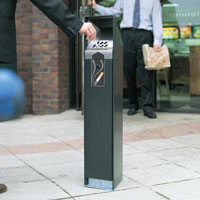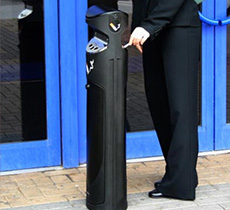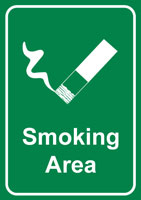Cigarette butts may be small but they have a big impact on the environment when they are incorrectly disposed – even more so as they are the most littered item in the United States of America. It is believed that 1.7 billion pounds of cigarette butts end up as trash each year as they continue to create worldwide environmental and health issues.
Did you know that the presence of litter in a community can decrease property values by a little over 7%? Not only is cigarette litter detrimental to wildlife and ecosystems, but it could also mean your business is unknowingly losing its appeal – what measures can you take to reduce cigarette butt littering at your workplace?
As the ban on smoking indoors and the workplace becomes more normal, smokers are being forced outside. By making some small changes to your workplace’s environment, you can deter smokers from littering their cigarette butts to create a cleaner and healthier environment for both your employees and community.
1. Create more opportunities

41.8% of employees who smoke reported that there were no ash receptacles at their work location. By choosing to supply accessible ash receptacles, you are providing smokers with the opportunity to dispose of their cigarette butts in a proper manner & deter any further littering. Try focusing on the placement of ash receptacles at points in which smokers are more likely in need of disposal such as entry and exits – for every additional receptacle, the littering rate decreases by 9%.
Take the first step & create the opportunity for your employees. We have a selection of ash receptacles that are designed to encourage the proper disposal of cigarette waste.
2. Educate your employees

Contrary to popular belief, cigarette butts are not biodegradable so it is important to educate your employees and stakeholders about the impact of being careless whilst disposing cigarette waste. Perhaps provide positive signage to remind employees how they are helping the environment when they make the conscious decision not to litter.
We attend various trade shows throughout the year where we love speaking to you & providing the information and expertise you need to educate your employees. See us at our next one!
3. Extend your efforts

A study has found that smokers are more likely to litter their cigarette butts if there are already other items of waste that have been littered. By extending your waste management efforts and providing additional trash and recycling points, you can encourage your employees to utilize all of your available waste streams and combat even more littering at your workplace. Why not take that extra step and organize a company clean-up?
With a huge selection of recycling containers available, coordinating your ash receptacles is easy! Take a look at our range, we’re sure we will have something to suit you.
4. Designate specific areas for smokers

It may be beneficial to designate particular areas in your workplace as smoking areas. This will act as a smoking control mechanism and enable you to collect cigarette butt litter in concentrated areas. By providing a comfortable environment with ash receptacles, lighting and shelter, your employees will feel more obligated to use them.
Don’t forget - we can personalize your ash receptacles and trash bins to ensure all the units fit perfectly into your organization’s environment.
Chat with us 1-855-874-5273
Email us inquiries@glasdon.com
Sources of material:
http://www.cigarettelitter.org/
Carlozo LR. Cigarettes: 1.7 billion pounds of trash. Chicago Tribune. 2008 Jun 18;
https://www.kab.org/cigarette-litter-prevention/economic-environmental-impact
https://www.kab.org/sites/default/files/LitterFactSheet_CIGARETTE_2016.pdf
http://www.longwood.edu/cleanva/cigbuttlitterpreventiontips.htm




